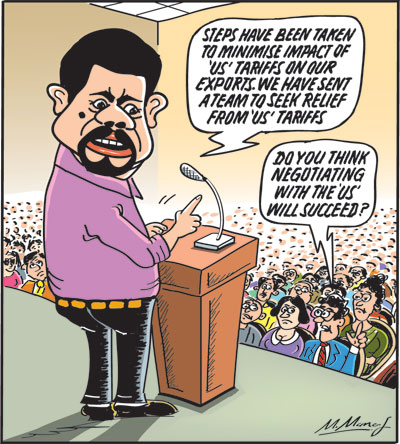Columns
Negotiating Trump’s tariffs and coping with global uncertainties and recessionary conditions
View(s):
President Anura Kumara Dissanayake has announced that he has taken measures to minimise the impact of US tariffs on our exports and sent a team to the US to obtain concessions. Will our negotiators be able to obtain a reduction of tariffs on our exports to the US and minimise the adverse impacts of US tariffs on our economy?
Foremost issue
The country has returned to work after the New Year festivities and is on the eve of a countrywide local council election. However, coping with the impacts of high US tariffs on our exports and facing global uncertainties on our external finances remain paramount issues.
Economic threats
The developing global economic conditions are not conducive to our economy. Our trade, tourism and remittances could be adversely affected. It is most likely that our trade deficit will widen; the balance of payments could be adversely affected by reduced remittances and earnings from tourism.
Furthermore, there are considerable uncertainties in the international economy that could undermine our fragile trade, tourist and remittance-dependent economy.
Unpredictability
The US Customs and Border Protection Authority was expected to collect a 44 percent tariff on Sri Lanka’s exports to the US from midnight on April 9. As it turned out, this was suspended for 90 days. Taxes on our exports to the US after 90 days are uncertain. In fact, President Trump’s tax regime, as well as the emerging global economic conditions, are highly uncertain. Nevertheless, there is no doubt that our economy would be severely weakened.
Impacts
The imposition of a 44 percent tariff on our exports would have a serious impact, especially on our garment exports. Consequently, large numbers of workers could be unemployed. Other manufactured exports too would lose export earnings.
Garment exports
The price increase on Sri Lankan garments is likely to shrink demand drastically. This is especially so as our competitors in the garments trade, like Bangladesh and Vietnam, are at a lower rate of tariffs.
About 40 percent of our garments are exported to the US, and garments are our main merchandise export. The export potential of solid tyres for heavy vehicles and aircraft is not likely to be severely affected by the price hike but could be affected by global recessionary conditions. Whether we could expand exports of solid tyres to countries like Russia, China and Europe remains to be explored. Nevertheless, there is no doubt that global recessionary conditions are likely to dampen demand for tyres and other rubber products.
Tea
The impact of US tariffs on our tea exports will be minimal, as the US is a small market for our tea. Our tea exports are constrained by inadequate production.
Trade deficit
Furthermore, global recessionary conditions would cause a further dent in our already large trade deficit. The likely global recession could be serious for our trade-dependent economy, as manufactured exports like solid tyres, ceramics and rubber products too could be adversely affected.
Oil prices
The only likely relief may be from lower oil prices. Already oil prices have fallen. Fertiliser prices too are likely to fall. However, the decrease in oil prices too could affect our economy adversely in several ways.
Tourism
We are heavily dependent on earnings from tourism. We were expecting to earn over US$ 4 billion from tourism this year. Although the number of tourists exceeded 1 million in the first three months of this year, tourism is likely to be adversely affected by recessionary conditions around the world and increased airfares.
Foreign assistance
Another significant development has been the curtailment of US assistance. USAID, the key US aid agency, has been scrapped. We can do very little to change this. One way to mitigate this disadvantage is to offer incomplete aided projects to other foreign aid agencies such as JAICA, SIDA, CIDA and other foreign government agencies.
Blow
The imposition of a 44 percent tariff on our exports to the US is a crippling blow to our external finances. The US is our main market for garments, solid tyres, and other rubber products. About 70 percent of our manufactured goods are to the US. Hopefully the respite of 90 days will allow a rush of exports to the US and also enable the government to negotiate lower tariffs for our exports to the US.
Apart from the direct impact on our exports to the US, recessionary conditions globally would affect tourism and remittances in the manner discussed earlier.
From whichever angle we look at the evolving global conditions, the economy is in a perilous state. Only time will tell how a new economic order would emerge.
Negotiations
On April 22, the government sent a team to Washington to negotiate for lower tariffs for our exports to the US. Whether there is a likelihood of success remains to be seen. The capricious manner in which US policies are decided on makes it difficult to predict the outcome.
Issues
Several issues pertaining to the government’s rush to send a mission to the US remain to be seen. Have we rushed into a situation too early, without adequate negotiating skills and observation of international trade responses? In other words, have we rushed to where angels would fear to tread?
Is our team competent to negotiate with a highly temperamental and unpredictable administration flouting the iron laws of economics and realities of trade policies? Hopefully, our negotiators would not come empty-handed.
Conclusion
The stability and growth of the Sri Lankan economy are very much dependent on the unpredictable global conditions.
Buying or selling electronics has never been easier with the help of Hitad.lk! We, at Hitad.lk, hear your needs and endeavour to provide you with the perfect listings of electronics; because we have listings for nearly anything! Search for your favourite electronic items for sale on Hitad.lk today!


Leave a Reply
Post Comment